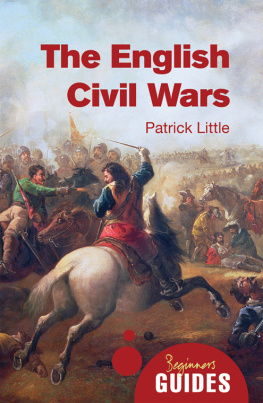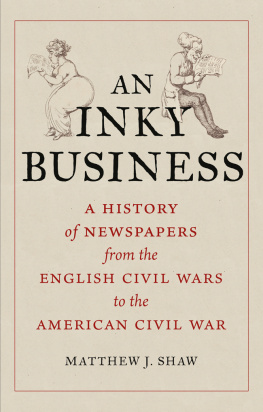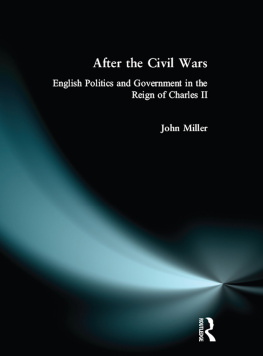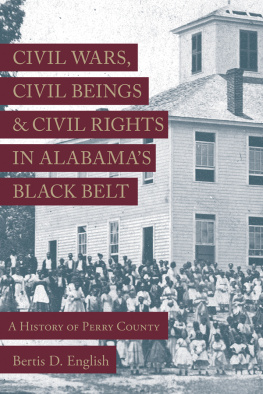Michael Braddick - Gods Fury, Englands Fire: A New History of the English Civil Wars
Here you can read online Michael Braddick - Gods Fury, Englands Fire: A New History of the English Civil Wars full text of the book (entire story) in english for free. Download pdf and epub, get meaning, cover and reviews about this ebook. publisher: Allan Lane, an Imprint of Penguin Group, genre: Religion. Description of the work, (preface) as well as reviews are available. Best literature library LitArk.com created for fans of good reading and offers a wide selection of genres:
Romance novel
Science fiction
Adventure
Detective
Science
History
Home and family
Prose
Art
Politics
Computer
Non-fiction
Religion
Business
Children
Humor
Choose a favorite category and find really read worthwhile books. Enjoy immersion in the world of imagination, feel the emotions of the characters or learn something new for yourself, make an fascinating discovery.
- Book:Gods Fury, Englands Fire: A New History of the English Civil Wars
- Author:
- Publisher:Allan Lane, an Imprint of Penguin Group
- Genre:
- Rating:5 / 5
- Favourites:Add to favourites
- Your mark:
- 100
- 1
- 2
- 3
- 4
- 5
Gods Fury, Englands Fire: A New History of the English Civil Wars: summary, description and annotation
We offer to read an annotation, description, summary or preface (depends on what the author of the book "Gods Fury, Englands Fire: A New History of the English Civil Wars" wrote himself). If you haven't found the necessary information about the book — write in the comments, we will try to find it.
Gods Fury, Englands Fire: A New History of the English Civil Wars — read online for free the complete book (whole text) full work
Below is the text of the book, divided by pages. System saving the place of the last page read, allows you to conveniently read the book "Gods Fury, Englands Fire: A New History of the English Civil Wars" online for free, without having to search again every time where you left off. Put a bookmark, and you can go to the page where you finished reading at any time.
Font size:
Interval:
Bookmark:
ALLEN LANE
an imprint of
PENGUIN BOOKS
ALLEN LANE
Published by the Penguin Group
Penguin Books Ltd, 80 Strand, London WC2R 0RL , England
Penguin Group (USA) Inc., 375 Hudson Street, New York, New York 10014, USA
Penguin Group (Canada), 90 Eglinton Avenue East, Suite 700, Toronto, Ontario, Canada M4P 2Y3
(a division of Pearson Penguin Canada Inc.)
Penguin Ireland, 25 St Stephens Green, Dublin 2, Ireland
(a division of Penguin Books Ltd)
Penguin Group (Australia), 250 Camberwell Road, Camberwell, Victoria 3124, Australia
(a division of Pearson Australia Group Pty Ltd)
Penguin Books India Pvt Ltd, 11 Community Centre, Panchsheel Park, New Delhi 110017, India
Penguin Group (NZ), 67 Apollo Drive, Rosedale, North Shore 0632, New Zealand
(a division of Pearson New Zealand Ltd)
Penguin Books (South Africa) (Pty) Ltd, 24 Sturdee Avenue, Rosebank, Johannesburg 2196, South Africa
Penguin Books Ltd, Registered Offices: 80 Strand, London WC2R 0RL , England
www.penguin.com
First published 2008
1
Copyright Michael Braddick, 2008
The moral right of the author has been asserted
All rights reserved
Without limiting the rights under copyright
reserved above, no part of this publication may be
reproduced, stored in or introduced into a retrieval system,
or transmitted, in any form or by any means (electronic, mechanical,
photocopying, recording or otherwise) without the prior
written permission of both the copyright owner and
the above publisher of this book
978-0-14-044757-6
For Karen, Cora and Melissa





In late April 1646 Charles I, a monarch very jealous of his dignity and personal authority, slipped out of Oxford disguised as a servant. A week later, after some apparently hesitant wanderings in the company of his chaplain and one personal friend, he surrendered to a Scottish army camped at Southwell, Nottinghamshire. Eight years earlier he had set out to crush religious protests in Scotland, never quite able to see the protesters as anything but rebels. But their campaign had set off a political and religious crisis that reverberated through all three of Charless kingdoms Scotland, Ireland and then England. Charles had been unable to establish military control in any of them and, following defeat in England, surrender to his original tormentors had come to seem his best option.

Charles I leaving Oxford in disguise, April 1646
This personal humiliation signalled the end of one of the most destructive conflicts in English history, in which a larger percentage of the population may have died than in the First World War, and huge amounts of property had been destroyed. Armies had tramped the land, bringing in their wake terrible plagues. The coming harvest was bad, the crops ruined by wet weather, and over the next four years famine threatened. To many contemporaries these were unmistakable judgements of God on a sinful land: war, disease and famine, three of the Horsemen of the Apocalypse. After four years of war in England, however, there was still no agreement about which sins, specifically, were being punished.
Three days after the surrender of the King a London bookseller called George Thomason bought a tract, Gods Fury, Englands Fire , which promised the answer. Thomason, an avid (perhaps obsessive) collector of pamphlets, had acquired around thirty tracts published during or dealing with the events of that week. They were dominated by two issues: the surrender of the King and the chaos of religious opinion that many now saw in England. With the King defeated, Gods judgement on the battle of arms now clear, it did not take much imagination to identify religion as the issue which should now be addressed. John Benbrigge, the author of Gods Fury , took as his text Isaiah xlii, 24-5:
Who gave Jacob for a spoil and Israel to the robbers? Did not the Lord? He against whom we have sinned? For they would not walk in his ways, neither were they obedient to his Law. Therefore he hath poured on him the fury of his anger, and the strength of battle, and it hath set him on fire round about; yet he knew not; and it burned him, and he laid it not to heart.
The general relevance was clear, but what was it that English sinners should lay to heart? Benbrigge promised to identify those spiritual incendiaries which have set church and state on fire and exhorted all persons to join together in seeking to quench it. He also promised to explain how to prevent the fire from being unquenchable in our ruin. Like many others he set out his partisan view in a laboured and formalistic argument, based on scriptural authorities. His difficulty though was that reasoning of this kind, and scriptural authority, could not convince doubters. In the lush world of civil war print there were too many competing voices of reason, and divergent readings of scripture, to clinch an argument this way. Other partisans could make a competing case in the same style, from similar authorities, while some renounced scholarship
Thomason eventually bought around 20,000 tracts between 1640 and 1660, a collection which reveals another dimension of the crisis: the very wide publicity given to these fundamental political disagreements. From the very beginning of the Scottish crisis partisans had distributed tracts, mobilized petitions, organized demonstrations and, eventually, raised armies. Benbrigge was by no means the most obscure figure to be given a public voice as a result leathersellers preached, women spoke of their visions to senior army commanders, men of pre-eminent obscurity purged churches of scandalous ministers and offensive images. Here was a challenge to the cultural authority not just of scripture and reason, but also of kings, bishops and gentlemen, of courts and institutions of government, of learning and universities. Contemporaries had no shortage of languages in which to describe the resulting chaos or to express anxiety: Thomasons collection is full of discussions of portents and wonders, and of the principles which, if agreed, might bring an end to fighting. But there were no such terms. As long as people like Benbrigge offered different versions of the nature of the problem, to a wide public and without finding new grounds on which to convince people, there remained a chaos of highly principled and competing certainties.
In one sense this was a crisis in Reformation politics over the nature of the true religion, how to decide what that was, and of the proper relationship between religious and secular authority. In Scotland a religious party, the Covenanters, took control of the discontents, mobilizing pretty much the whole kingdom around a manifesto for a new settlement. They created a radical movement but one that had clear goals and, therefore, clear limits. The combination of a unified Scottish church and a revolutionary constitution gave control to identifiable political leaders: it was a revolution defined in theory and practice by Reformation politics. In Ireland, Catholic elites excluded from power on the basis of their religion took advantage of the crisis, seeking to recover their position by appealing to their king, in opposition to his English parliament and the Protestant political establishment. In the process they unleashed a popular revolt against Protestant settlement. Armies from Scotland and England were sent to defend the Protestant interest and Ireland eventually suffered the greatest devastation: a bloody, sectional conflict whose memory and relevance live on.
Font size:
Interval:
Bookmark:
Similar books «Gods Fury, Englands Fire: A New History of the English Civil Wars»
Look at similar books to Gods Fury, Englands Fire: A New History of the English Civil Wars. We have selected literature similar in name and meaning in the hope of providing readers with more options to find new, interesting, not yet read works.
Discussion, reviews of the book Gods Fury, Englands Fire: A New History of the English Civil Wars and just readers' own opinions. Leave your comments, write what you think about the work, its meaning or the main characters. Specify what exactly you liked and what you didn't like, and why you think so.









